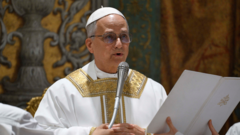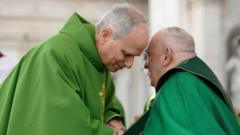The selection of Pope Leo XIV reflects modernity in papal leadership with a blend of American background and international experience.
Pope Leo XIV: A New Era Begins for the Vatican

Pope Leo XIV: A New Era Begins for the Vatican
Robert Francis Prevost's Election Marks a Fresh Approach for the Catholic Church
In a surprising turn of events within the Vatican, the conclave has elected Robert Francis Prevost as the new Pope Leo XIV, sending waves of astonishment across the global Catholic community. Born and raised in the United States, Prevost has spent significant time in Peru, where he served as a bishop and led the Pontifical Commission for Latin America. His involvement in these regions positions him as a key figure bridging diverse cultures while maintaining the Vatican's financial ties to the U.S., a major supporter of the church.
Prevost, who previously held a prominent role under Pope Francis, was noted for fostering a more inclusive and grassroots approach to church governance, easing concerns among the liberal faction of the church. Known for his leadership of the Order of St. Augustine, he demonstrated a nuanced understanding of global challenges facing religious communities.
At 69, his age is perceived as advantageous, marking him as mature yet approachable. Historically, his American roots could have posed a hurdle in the papal race, considered a liability due to past sentiments regarding U.S. influence. However, in this evolving ecclesiastical landscape, such national biases seem to have diminished, allowing 133 voting cardinals to completely embrace his candidacy.
"He checked all the boxes," remarked John Allen, a respected Vatican analyst. The successful election of Leo XIV signals a transformative moment for the church, promising to navigate the complexities of modern spiritual leadership while appealing to a broader, international audience.
As the new pope greets the faithful from the iconic central balcony of St. Peter’s Basilica, many are left pondering what this election truly represents for the future direction and unity of the Catholic Church.
Prevost, who previously held a prominent role under Pope Francis, was noted for fostering a more inclusive and grassroots approach to church governance, easing concerns among the liberal faction of the church. Known for his leadership of the Order of St. Augustine, he demonstrated a nuanced understanding of global challenges facing religious communities.
At 69, his age is perceived as advantageous, marking him as mature yet approachable. Historically, his American roots could have posed a hurdle in the papal race, considered a liability due to past sentiments regarding U.S. influence. However, in this evolving ecclesiastical landscape, such national biases seem to have diminished, allowing 133 voting cardinals to completely embrace his candidacy.
"He checked all the boxes," remarked John Allen, a respected Vatican analyst. The successful election of Leo XIV signals a transformative moment for the church, promising to navigate the complexities of modern spiritual leadership while appealing to a broader, international audience.
As the new pope greets the faithful from the iconic central balcony of St. Peter’s Basilica, many are left pondering what this election truly represents for the future direction and unity of the Catholic Church.




















